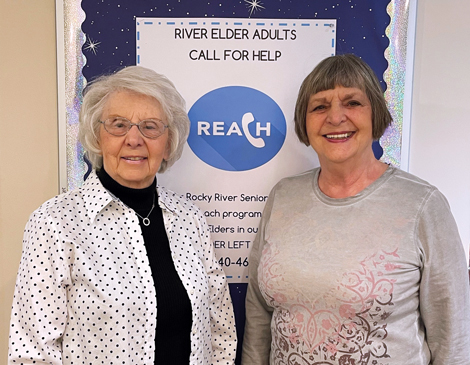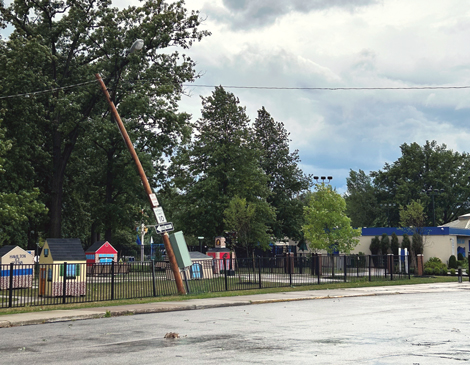Neighbors with generators opened their doors to help power phones and computers — and coffeemakers, too. Throughout Rocky River following the Aug. 6 macroburst of tornados, residents responded with support. They created homegrown living room workspaces for each other, sharing meals, helping manage cleanup and sorting through the aftermath without power.
The Civic Center became home base to those needing to work and plug in. The Senior Center made personal calls to check up on older community members. Residents treated the entire community as their own backyard, helping wherever and whenever needed.
“As a city, we can set the stage and create a culture of caring, but it’s really the neighbor-to-neighbor outreach that helps us make the best of really difficult situations,” says Mayor Pamela Bobst, referring to an event that serves as a reminder of why the city is focused on emergency preparedness — an evolving effort with continuous updates.
“While the tornado was unexpected, our emergency plans were in place, and those allowed us to respond quickly,” she says.
“Neighbors often become first responders, as well,” Bobst adds, sharing a reel of stories from simple check-ins to friends mobilizing for childcare or moving century-old tree trunks to the curb. “It speaks so highly of the level of compassion and care in our community.”
Aside from compassion, the city’s leadership, commitment and communication allowed the administration to immediately shift into “go mode” after the storm, says Safety Service Director Rich Snyder. Forces were dispatched instantaneously and ran nonstop. Rocky River residents were all in it together to manage post-storm recovery.
“We have emergency response plans in place, and we know what to do to keep residents and staff safe. Our police station dispatch center is a tornado shelter,” Snyder points out. “As a community, we are prepared — and that takes active engagement and active communication.”
Community Response – Tackling Tough Times
Snyder was meeting with Mayor Bobst in her office when cellphones across the region blared with a message to take cover. In that moment, likely caused by the alerts, a four-car collision occurred at Hilliard and Wagar by City Hall. Firefighters and police rushed to the scene.
“They were dealing with the accident in the wind and rain, and as the tornado was blowing through the city, they had the presence of mind to send those accident victims to our police station to take cover,” Snyder says.
The collision is yet another testament to the city’s immediate response to both acute and widespread safety hazards.
“Our No. 1 priority was making sure our residents were safe,” Snyder says of a multipronged, hands-on effort involving all city departments and volunteers from the community.
Immediately, the police and fire dispatch call volume skyrocketed. Police Chief George Lichman says during a 90-minute period between 4 to 5:30 p.m., 64 calls flooded in. That was as many as the previous 24-hour period, and the call log eventually totaled 174 calls for service that day.
“Fortunately, we had professional and nonsworn staff who were still here to help with dispatching, and some detectives who were still here got out onto the roads while we started calling in police officers and auxiliary officers,” Lichman says.
The fire department usually receives about 10 calls per day and logged about 160 during a two-day period while canvassing city streets to clear roads, tape off live wires and assess property damage. With a prioritization process in play across city departments, immediate action centered on addressing blocks with downed wires and fallen trees.
“In these incidents, we work hand in hand with First Energy,” says Fire Chief Aaron Lenart. “They keep us up to date, we keep them up to date, and we work through Westcom Central Dispatch for incident reports and priority logs that also go to First Energy.”
The order of duty: safety first, injury and preventive safety next, then property damage.
Departments sprung into action, handling immediate danger in the field, including assessing damage to inform an extensive recovery.
“Part of our emergency response plan is to identify the conditions and then take direct action,” Snyder explains. “Our personnel really stepped up and were working 12-plus hours a day for about a week to get roads opened up and debris collected. Our community members are resilient. There was no pause. This happened, we cleaned up, and we moved forward.”
City service personnel tirelessly collected limbs, branches — entire lumbered trees — and crews helped residents cut up tree remains with chainsaws. Usually brush collection requirements are less than 4 feet. Not after this storm. “It didn’t matter; if it was out there, we were picking it up,” Snyder says.
Meanwhile, the public facilities and maintenance department directed by Mike Balla monitored and fueled the three building generators daily, powering the fire department, police department and Civic Center during the widespread power outages. Facilities staff set up charging and workstations in the Civic Center event spaces where residents could charge devices and work remotely. “During the week, we had people coming at 6:30 and 7 a.m. so they could work, and we ended up adding quite a few more tables and charging stations so we could accommodate everyone,” Balla says, noting the center was open until 11 p.m. nightly while power was out. Aside from charging electronics and working, residents could stay cool, shower and access information.
A sense of camaraderie lightened the mood as residents who never knew each other found themselves connecting at the Civic Center. “They were enjoying talking with each other as they handled what work they had to do, and residents could stop in for a little bit to charge electronics or stay the day if they needed,” Mayor Bobst says.

At the same time, the Rocky River Senior Center moved its senior transportation and social work services to an office at City Hall, where a generator was running. “We were able to continue transportation services as needed and make calls to check up on all of the older residents registered with our River Elder Adult Community Helpline (REACH) program,” says Deb Huff, director of the Senior Center.
Continuously reevaluating disaster preparedness and integrating plans with infrastructural improvements positions the city and residents to stay ahead of incidents.
River seniors were fully served by charging stations and amenities at the Civic Center. However, Huff says, “The Senior Center will be installing a generator as part of the building addition commencing soon. And, as a result of the tornado, in the future we will be well prepared to provide a comfortable place for seniors to continue their activities, programs and charge their devices.”
A Collaborative Initiative
More than 300 First Energy trucks and crews from across state lines filled Rocky River High School’s parking lot, which was equipped with solar-powered tents as a regional staging area for the utility provider. “Talk about the community coming together — there were residents who would provide them with meals, snacks and drinks and residents would see them repairing lines in front of their homes and offer them coffee and water,” Snyder says.
The high school served as a central headquarters for First Energy units from across the country.
“They were out all night assessing, working and prioritizing repairs,” Snyder says. “A difficult thing to understand is you might not see action right away, but there is a ton going on in the background.”
Additional dumpsters were brought into the city to manage the overrun of food spoils from the power outage, which created a high-volume of refuse.
Collaborative partnerships across the region and with utilities providers helped expedite storm cleanup and the return of power, despite extreme damage.
The city works diligently and maintains ongoing communications with organizations including Westcom (Westshore Central Dispatch Center), First Energy, Cox Communications, AT&T and other providers.
“Communication is very important, and it takes a team effort to provide the services necessary to get the community through circumstances like this,” Snyder says.
Flexibility is also key.
“It’s ‘We know what needs to get done. We do this. Be ready to pivot,’ and we figured out the best way forward,” Snyder adds.
And, as power was restored in pockets of the city, community members opened their doors for recharging and respite.
The ongoing dialogue, Mayor Bobst relates, was one of, “Are you OK? What do you need?”
“It reminds me of the way we have always come together like during Superstorm Sandy and our response to the COVID pandemic,” she continues. “We traverse these challenging situations together.”
Safety Tip: Live Wires
With many power lines traversing backyards, a downed wire up the street — even if not on your property — can activate infrastructure like chain-link fencing, says Fire Chief Aaron Lenart. “A power line touching a fence at the other end of the block can become extremely hazardous,” he says.
Basically, fencing can become a conduit, carrying an electric charge across multiple properties.
“A phone line can get torn off the house and may lay across a power line, so now that phone line is also energized,” Lenart points out. “The same is true with cable.”
The bottom line: “Think about where power might leak and what else could be charged,”
he advises.
Communication is Key
Stay informed, receive real-time updates and be in the know:
ReadyNotify
Stay connected 24/7 with emergency alerts, important advisories, community updates and traffic information. Sign up for ReadyNotify by cellphone, email and online at cuyahogacounty.gov/ready. You’ll find a link prominently displayed at the top of the City of Rocky River’s newly updated website.
RRcity.Com
Check out the city’s website for the latest updates, events and access to all community departments and services. This online portal is a single stop for Rocky River services.
FirstEnergy
Always report outages, even when they are widespread. FirstEnergy prioritizes service based on these reports. You can report outages online at FirstEnergyCorp.com/outages or by calling 888-544-4877.




